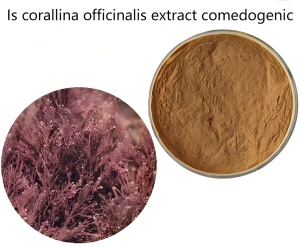Is corallina officinalis extract comedogenic

Introduction to Corallina Officinalis Extract
Corallina officinalis extract, derived from a species of red algae commonly found along the rocky shores of Great Britain and Ireland, is gaining popularity in the skincare industry. This marine-derived ingredient is prized for its rich composition of minerals, polysaccharides, and antioxidants, which contribute to its skin conditioning and anti-aging properties. But a common question arises: Is Corallina officinalis extract comedogenic? In this article, we’ll explore its benefits, potential risks, and whether it’s suitable for acne-prone skin.
What Is Corallina Officinalis Extract?
Corallina officinalis is a red seaweed with a coral-like structure due to its high calcium carbonate content. The extract is obtained through gentle processes like solvent or water-based extraction, preserving its bioactive compounds such as calcium, magnesium, polysaccharides, and antioxidants. These components make it a valuable ingredient in cosmetics, where it functions primarily as a skin conditioning agent, helping to hydrate, support the skin’s barrier, and provide antioxidant protection against free radicals.
Skin Benefits of Corallina Officinalis Extract
The extract offers several skin benefits, making it a sought-after ingredient in skincare formulations. Its high mineral content, particularly calcium and magnesium, supports skin structure and regulates oil production, which can benefit oily or combination skin types. The polysaccharides provide hydration, improving skin texture and moisture retention. Additionally, its antioxidant properties help neutralize free radicals, potentially reducing signs of premature aging like wrinkles and age spots. For those seeking natural ingredients, Corallina officinalis extract is also vegan and plant-based, aligning with eco-conscious skincare trends.
Does Corallina Officinalis Extract Clog Pores?
Comedogenicity refers to an ingredient’s potential to clog pores, leading to blackheads or whiteheads, rated on a scale from 0 (non-comedogenic) to 5 (highly comedogenic). When it comes to Is Corallina officinalis extract comedogenic, studies and sources suggest it has a low comedogenic rating, typically around 1 or 3 depending on the source. This makes it generally safe for most skin types, including acne-prone skin. However, some sources caution that its exfoliating properties, when used in powdered form, may pose a slight risk for those with severe acne, as it could potentially irritate or clog pores if not properly formulated. Always perform a patch test when introducing products with this ingredient, especially if you have sensitive or blemish-prone skin.
Is It Safe for Acne-Prone Skin?
For individuals with acne-prone skin, the low comedogenic rating of Corallina officinalis extract is reassuring. Its skin conditioning and anti-inflammatory properties can even benefit acne-prone skin by maintaining hydration and soothing irritation. However, comedogenic ratings are not foolproof, as they are often based on high-concentration tests that don’t reflect typical skincare formulations. If you’re prone to breakouts, monitor how your skin responds and opt for products where this extract is combined with non-comedogenic ingredients to minimize risks.
How to Use Corallina Officinalis Extract in Your Skincare Routine
Corallina officinalis extract is found in various products, including moisturizers, serums, and cleansers. To incorporate it effectively, start with a product suited to your skin type—hydrating serums for dry skin or lightweight gels for oily skin. Apply after cleansing and toning, following with sunscreen during the day. Since it’s generally non-irritating, it’s suitable for daily use, but always check product labels for other potentially comedogenic ingredients. Responsible sourcing is also key, as sustainable harvesting preserves marine biodiversity.
Conclusion
In summary, Corallina officinalis extract is a versatile skincare ingredient with significant benefits, including hydration, antioxidant protection, and oil regulation. Regarding the question, “Does Corallina officinalis extract clog pores?” its low comedogenic rating suggests it’s generally safe for most skin types, though those with severe acne should proceed cautiously and patch-test products. By understanding its properties and how it fits into your routine, you can harness the power of this red algae extract for healthier, glowing skin.
